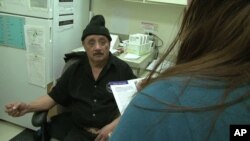A Muslim American group in the Midwestern city of Chicago is trying to break down stereotypes and improve Islam's image through a holistic model of community service.
Sergio Delgado is an undocumented and jobless Mexican living in Chicago.
He cannot afford health care. So he comes regularly to this free clinic run by the Inner City Muslim Action Network, also known as IMAN.
"The clinic is very important for people like us who can't get help elsewhere. And everyone here is also extremely helpful," said Delgado.
Adiba Khan heads the clinic and a team of doctors, nurses and volunteers.
When patients come through the door, Khan says they discover many other services are available. And, she says, they also encounter friendly Muslims.
"IMAN clinic is special in the sense that it's not just a clinic," she explained. "It's inter-departmental. It's part of a career development center and a youth program and an arts and culture development too. So they can see that Muslims are normal people, living normal lives, and it alleviates that fear."
Next to the clinic, Muslims and non-Muslims attend a class on filmmaking. The students have film projects and share ideas.
Iraq war veteran Melvin Lyons is working on a music video. During a break, he says he feels at ease here.
"They are not going to preach to you over and over that you should do this, or should become a Muslim," he said. "They are going to continue to live their lives the way that they feel is the best and, through that, lead by example to the people that come through their doors."
IMAN also gets involved in issues such as trying to get grocery stores to offer healthier options. The group calls parts of Chicago, a "food desert", meaning healthy food is not available. IMAN also helps former prisoners trying to readjust.
Bilaal Evans used to come here for the activities. He was eventually hired as a security guard. He works seven days a week, because he has lots of bills to pay.
He says places like IMAN help break down discrimination.
"You are always going to have racism, you are always going to have sexism, you are always going to have classism, that is something that we cannot change in one fell swoop, but with work and efforts like what is being done at IMAN, we chip away at that, one person, one character, one idea at a time," he said.
Ndidi Okakpu has a grant to help IMAN with its expansion plans. She says she's proud of the group's sense of social justice.
"There's definitely been a call, like a demand," she said. "Different cities across the country, and even some outside of the country, have observed our work here, [and] believe in the same principles and ethical guidelines that we try to uphold."
Okakpu says studies are currently being conducted in her hometown Washington and in New York to see if IMANs can be started there.
For now, Delgado, the Mexican patient, says he is grateful for the help he is receiving here.
He is Catholic, but he says he has started learning a few Islamic expressions, such as the greeting "As-Salamu Alaykum," which means "Peace Be Upon You."




